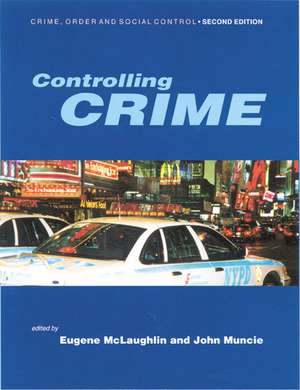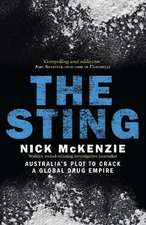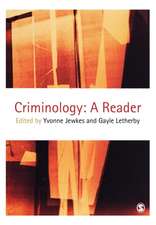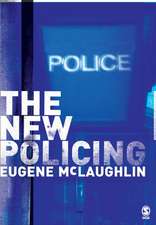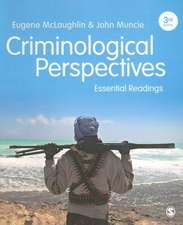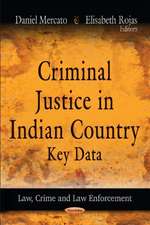Controlling Crime: Published in association with the Open University
Editat de Eugene McLaughlin, John Muncieen Limba Engleză Paperback – 14 mar 2001
Din seria Published in association with the Open University
- 5%
 Preț: 358.34 lei
Preț: 358.34 lei -
 Preț: 394.76 lei
Preț: 394.76 lei -
 Preț: 300.52 lei
Preț: 300.52 lei - 5%
 Preț: 296.54 lei
Preț: 296.54 lei -
 Preț: 428.84 lei
Preț: 428.84 lei - 5%
 Preț: 317.29 lei
Preț: 317.29 lei -
 Preț: 337.14 lei
Preț: 337.14 lei -
 Preț: 384.05 lei
Preț: 384.05 lei -
 Preț: 334.51 lei
Preț: 334.51 lei -
 Preț: 333.32 lei
Preț: 333.32 lei -
 Preț: 336.67 lei
Preț: 336.67 lei -
 Preț: 352.89 lei
Preț: 352.89 lei -
 Preț: 377.75 lei
Preț: 377.75 lei -
 Preț: 380.03 lei
Preț: 380.03 lei -
 Preț: 430.74 lei
Preț: 430.74 lei -
 Preț: 379.77 lei
Preț: 379.77 lei -
 Preț: 330.50 lei
Preț: 330.50 lei - 8%
 Preț: 377.32 lei
Preț: 377.32 lei -
 Preț: 449.06 lei
Preț: 449.06 lei -
 Preț: 282.23 lei
Preț: 282.23 lei -
 Preț: 410.30 lei
Preț: 410.30 lei -
 Preț: 220.37 lei
Preț: 220.37 lei -
 Preț: 349.50 lei
Preț: 349.50 lei -
 Preț: 385.04 lei
Preț: 385.04 lei -
 Preț: 432.05 lei
Preț: 432.05 lei - 23%
 Preț: 544.81 lei
Preț: 544.81 lei -
 Preț: 396.86 lei
Preț: 396.86 lei - 19%
 Preț: 462.04 lei
Preț: 462.04 lei -
 Preț: 485.68 lei
Preț: 485.68 lei - 15%
 Preț: 450.91 lei
Preț: 450.91 lei -
 Preț: 376.34 lei
Preț: 376.34 lei -
 Preț: 410.62 lei
Preț: 410.62 lei - 15%
 Preț: 432.23 lei
Preț: 432.23 lei - 15%
 Preț: 445.49 lei
Preț: 445.49 lei -
 Preț: 457.80 lei
Preț: 457.80 lei - 15%
 Preț: 433.70 lei
Preț: 433.70 lei -
 Preț: 441.06 lei
Preț: 441.06 lei -
 Preț: 364.13 lei
Preț: 364.13 lei - 15%
 Preț: 443.13 lei
Preț: 443.13 lei - 15%
 Preț: 434.03 lei
Preț: 434.03 lei -
 Preț: 441.65 lei
Preț: 441.65 lei - 19%
 Preț: 436.03 lei
Preț: 436.03 lei -
 Preț: 523.94 lei
Preț: 523.94 lei - 15%
 Preț: 523.27 lei
Preț: 523.27 lei - 15%
 Preț: 428.46 lei
Preț: 428.46 lei -
 Preț: 460.68 lei
Preț: 460.68 lei
Preț: 428.36 lei
Nou
Puncte Express: 643
Preț estimativ în valută:
81.96€ • 85.59$ • 67.68£
81.96€ • 85.59$ • 67.68£
Carte tipărită la comandă
Livrare economică 15-29 aprilie
Preluare comenzi: 021 569.72.76
Specificații
ISBN-13: 9780761969730
ISBN-10: 076196973X
Pagini: 352
Dimensiuni: 189 x 246 x 20 mm
Greutate: 0.89 kg
Ediția:Second Edition
Editura: SAGE Publications
Colecția Sage Publications Ltd
Seria Published in association with the Open University
Locul publicării:London, United Kingdom
ISBN-10: 076196973X
Pagini: 352
Dimensiuni: 189 x 246 x 20 mm
Greutate: 0.89 kg
Ediția:Second Edition
Editura: SAGE Publications
Colecția Sage Publications Ltd
Seria Published in association with the Open University
Locul publicării:London, United Kingdom
Cuprins
Introduction - Eugene McLaughlin and John Muncie
The Origins and Development of the Police - Clive Emsley
Key Issues in Policework - Eugene McLaughlin
Critical Decisions and Processes in the Criminal Courts - Loraine Gelsthorpe
Prison Histories - John Muncie
Reform, Repression and Rehabilitation
Prisons, Punishment and Penality - Richard Sparks
The Competing Logics of Community Sanctions - Gordon Hughes
Welfare, Rehabilitation and Restorative Justice
Community and Crime Prevention - Sandra Walklate
The Origins and Development of the Police - Clive Emsley
Key Issues in Policework - Eugene McLaughlin
Critical Decisions and Processes in the Criminal Courts - Loraine Gelsthorpe
Prison Histories - John Muncie
Reform, Repression and Rehabilitation
Prisons, Punishment and Penality - Richard Sparks
The Competing Logics of Community Sanctions - Gordon Hughes
Welfare, Rehabilitation and Restorative Justice
Community and Crime Prevention - Sandra Walklate
Descriere
This Second Edition of Controlling Crime provides an important evaluation of criminal justice in the United Kingdom during a period of rapid social change. Each chapter encourages historical, comparative and critical reflection on the organizational logics, powers, procedures and practices of the criminal justice system.
